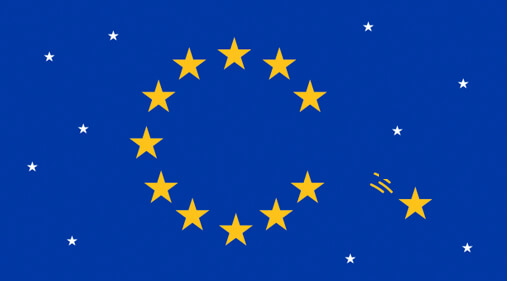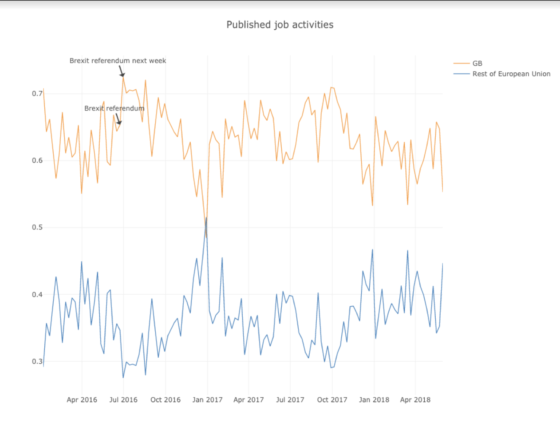Don’t forget the ‘human’ in Brexit HR implications

Friday, the 24th of June, 2016, wasn’t like the usual Fridays we’d had at work. The tech startup I worked for was successful, but still relatively small at 105 employees. What made it feel much larger was the 38 nationalities who worked alongside me in my daily work life. Fridays were traditionally about a longer lunch, an “all hands” meeting with the CEO and drinks, for those that wanted them, with their peers. This Friday wasn’t the same.
On waking on that Friday morning, I found my neatly curated social media bubble punctured. I’d gone to sleep at about midnight, shortly before I’d watched Nigel Farage seem to give a speech of capitulation. He later said of the moment: “I’d reached the end of my campaign, I’d physically and mentally reached the end of the road. I sank into a deep depression during the course of that afternoon… convincing myself that we’d lose.”
“Great!” I thought, as I went to sleep, fully expecting to wake up a remaining member of the happy EU family.
| DISCLAIMER: We know the impact on your recruitment efforts is immeasurable, and we hope we can help you navigate the uncertainty of this period. With some adjustments in dates and schedules, you’ll still find a solid ally in our Brexit content. |
Instead, I remember the morning of Friday, the 24th of June, 2016, as grey and overcast. Some people didn’t come in to work at all and those that did seemed quiet and cowed by the apparent rejection of their adopted country. There wasn’t the normal “Friday Feeling”. Instead, it felt more like shellshock.
As someone who works in recruitment, the shock I felt was replaced with concern for the company and the wider workforce. In the weeks after the referendum, I felt that we were seeing fewer applications from abroad and even had a few people leave the company to return to their own countries. Although I spoke to other recruiters in the industry who expressed similar feelings, there was no concrete data to support the anecdotal evidence we all felt was so obvious.
The ensuing time since the Brexit referendum vote has been a roller coaster for those in the recruitment industry. We’ve seen changes to the existing visa system, quotas placed on that system and subsequently withdrawn, and a back-and-forth on immigration policy. Uncertainty for EU nationals was replaced with the right to remain for a price and the factions on both sides of the debate remain polarised and vitriolic.
In the time since the vote, I also changed my role and moved to Workable. I found myself speaking to people, from all levels across the UK, who were involved in hiring and trying to keep talent within their organisations. The stories that people told are of the same roller coaster I had experienced. The boom-and-bust cycle of uncertainty was seemingly more frequent as the labour market tracked the weekly Brexit newscycle. It was only in my role at Workable that I was able to see the effect of Brexit in real terms. As you can see in the following graph, published job activities in the UK on the Workable job board dropped significantly from the week following the Brexit referendum (as indicated at the point marked “Brexit referendum next week”) until finally seeing a kind-of recovery starting January 2017.

The feeling of a wider negative effect, and the feeling that when in a role like HR or recruitment you shouldn’t be “political,” meant that there wasn’t much public conversation in the HR and Recruitment industry – Brexit HR implications aside. Practitioners live with the uncomfortable duopoly of both waiting to see what others do as well as give guidance and advice to their own organisations.
For those organisations with a time to hire in the 20+ days range, the dips and peaks of this data hide the stories of the individuals caught up in the rapidly changing environment. The candidate that applies one week and withdraws the next, the candidates who simply disappear, and the candidates who we’ll never know about because the whole thing just put them off before they even hit “apply”. It’s true to say that the position I found myself in on that grey Friday morning hasn’t changed for many of the people engaged in the attempt to convince people to change jobs throughout the UK. It’s the lot of the hardworking recruiters to roll with the punches of an already tough talent market. This market made even tougher by the pressures of an educated and skilled workforce either being tempted to, or tempted back to, Europe. It was only the day after the vote when a truck towing a large sign advertising jobs in Berlin prowled the streets of London’s tech hub.
Recruiters remain the squeezed middle in a no-win game of “What is Best Practice?” Brexit, unlike most regulatory change that we face, has proven to be a game where not only do the rules change each week but one team has split into three new players and then as halftime approaches someone has run away with the ball altogether.
The true impact of Brexit – and especially, Brexit HR implications – won’t be known until the final days of March 2019 and even then extracting meaning and a tactical approach from the legal wranglings won’t be pretty… but, hey, we survived GDPR, right? Right?




